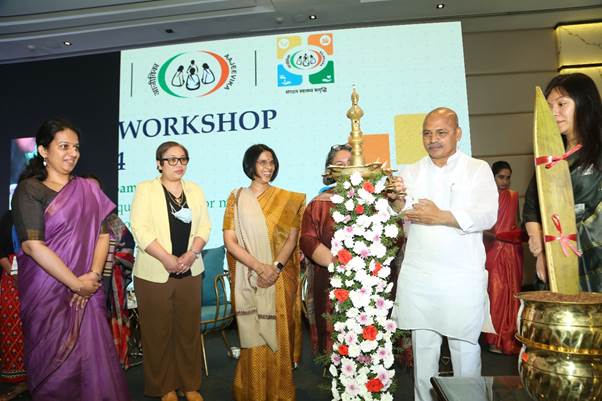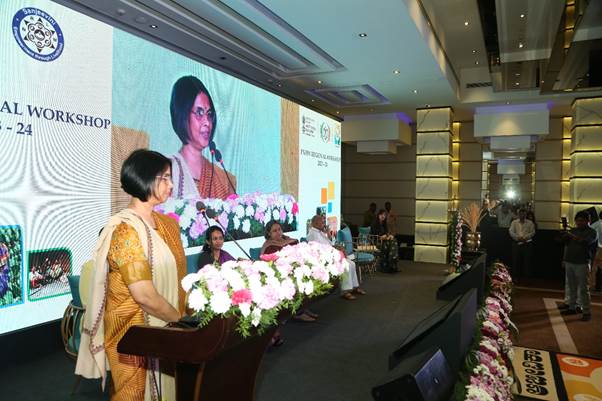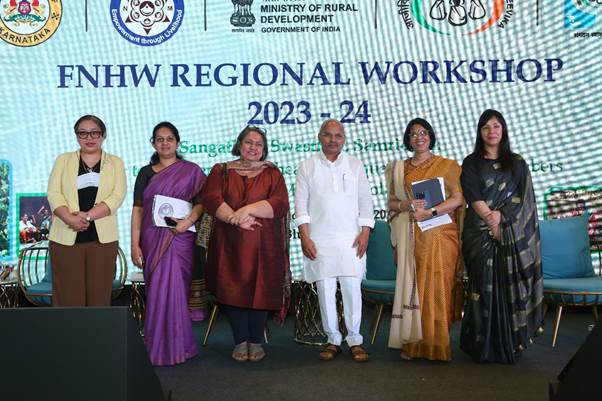DAY– NRLM organised two-day regional workshop to strengthen SHG-led Food, Nutrition, Health, and WASH efforts for its 9.96 crore members
The Deendayal Antyodaya Yojana – National Rural Livelihoods Mission (DAY-NRLM), Ministry of Rural Development (MoRD), organised a two-day regional workshop in which as many as 17 State Rural Livelihoods Missions (SRLMs) along with other key stakeholders deliberated on roadmap to improve food, nutrition, health and WASH (FNHW) outcomes for more than 9.98 crore members of Self-Help Groups and their households across India. Minister of Medical Education & Skill Development, Entrepreneurship and Livelihoods, Karnataka Dr. Sharanaprakash Rudrappa Patil was the Chief Guest of the Workshop. Additional Chief Secretary, Department of Skill Development Entrepreneurship and Livelihood, Karnataka, Ms Uma Mahadevan and Joint Secretary, MoRD Ms. Smriti Sharan were also present on the occasion.

Dr. Sharanaprakash Rudrappa Patil acknowledged commitment and dedication of women for the success of poverty alleviation programmes. He stated that income generation activities like production of sanitary napkins can be done by SHG women that would provide them sustainable livelihoods. He added that concrete steps like marketing of SHG products and facilitate linkages with banks would further fortify the strength of women collectives.
Commending the potential of women collectives Ms Uma Mahadevan stated that SHGs should be a room of women in as many as 6000 gram panchayats in Karnataka. Women become influencers by adopting recommended behavior change in the mode of executing daily activities. She further mentioned that the FNHW interventions through women collectives holds great potential for convergence.

Setting the context for the need of FNHW integration in DAY-NRLM, Ms. Smriti Sharan stated that multidimensional poverty is a significant roadblock to keep people out of poverty. The FNHW interventions have significant presence to move towards nutritional sufficient nation and enhance livelihoods for women. She added that the MoRD will collaborate with Line Ministries to make significant contributions towards improved nutrition, health and sanitation aspects among rural communities.

The conclave aimed to consolidate learnings derived from the ongoing efforts and interventions undertaken by women of Self-Help Groups (SHG) across the country under DAY-NRLM to improve health, nutrition and WASH status of rural communities. The women led SHGs and its federations promote health seeking behaviour through social behaviour change; promote creation of agri-nutri gardens for consumption of nutritious meals round the year; facilitates access to entitlements and services in collaboration with front line workers from line departments to gain better nutrition and health outcomes.
The conclave was second in a series of consultations to encapsulate FNHW achievements; draft a guideline for establishing effective strategy document to implement FNHW activities across states; streamline collaborations with line departments and development partners to support existing on-ground FNHW interventions besides ideating for innovations and research to amplify efficacy and reach of SHGs’ efforts.
Highlighting extensive activities undertaken by women led SHG network for improved status of nutrition and health in rural communities, officials from different State Rural Livelihoods Missions; Women and Child Department; Health; Drinking Water and Sanitation, along with Community Resource Persons (CRP) shared on-ground experiences and journey.

An interactive panel discussion with experts, researchers, academicians, development agencies having mutual goals, and line departments delved into fortifying FNHW aspects to enable rural communities with good health and enhanced livelihood opportunities.
As many as three community resource persons from Tamil Nadu, Odisha and Karnataka reflected on FNHW on-ground activities while sharing respective experiences that brought effective results in communities.
An exhibition-cum-marketplace displayed best practices and models of FNHW strategies such as Poshan Vatika, products by enterprises, behaviours that lead to social development and so on.

